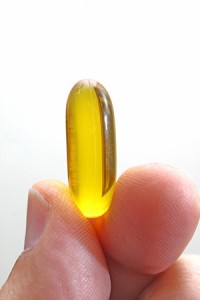
Thousands of studies on omega-3 fats in the last three decades, both observational studies and randomized controlled trials, have found benefit in omega-3 supplementation.
by Mary Budinger —
A recent study published in the Journal of the National Cancer Institute, known as the SELECT clinical trial, concluded that higher blood levels of the omega-3 fat DHA correlated to higher prostate cancer risk. Lead author Theodore Brasky suggested that men cut down on their fatty fish intake.
Critics call the study “absurd.” Dr. Jonny Bowden says, “You might well think that researchers divided a population of men into two groups, gave one group fish oil supplements and the other a placebo, and found that the ones who took the fish oil supplements got way more prostate cancer than the ones who did not. Right? Wrong. The first thing you need to know is that no fish oil supplements — or any other kind of supplements, for that matter — were given in this study. So let us be clear. Supplements were not a part of the study and were not given to the participants.”
Dr. Joseph Mercola advises, “Correlation is not the same as causation. Another immediate tip-off that something is awry is the finding that participants who had the highest levels of trans fats in their blood had the lowest risk for prostate cancer. Headlines [generated by this study] are perfect examples of gross misreporting of science by the media.”
Though DHA levels in the blood go up when you consume lots of omega-3s, they can also go up for other reasons. One such reason being alterations in fatty-acid patterns caused by a low-fat diet, a change likely related to decreased competition for the enzymes of elongation and desaturation. In other words, a higher percentage of DHA might mean a lower percentage of something that was not investigated.
“This is a classic case of correlation clashing with biological plausibility — and it highlights why observational studies, with their slew of undocumented variables and contradictory findings, cannot tell us anything definitive about food and disease,” says nutrition blogger Denise Menger. “To the 99 percent of the population who does not have the time or understanding to dig through the study, these findings are going to look like a slam against fish and fish oil.”
Thousands of studies on omega-3 fats in the last three decades, both observational studies and randomized controlled trials, have found benefit in omega-3 supplementation.
“Considering the extensive body of literature that supports the anti-inflammatory effects of omega-3 fatty acids, there is no credible biological mechanism, nor is one suggested in the article, that would explain why these essential fatty acids might increase tumorigenesis,” states Dr. Bob Roundtree, chief medical officer at Thorne Research. “The study’s conclusions are based wholly on the results of a single blood test.”
Sources: Brasky, T., Darke, A., et al. Plasma Phospholipid Fatty Acids and Prostate Cancer Risk in the SELECT Trial. J Natl Cancer Inst. July 10, 2013.
Mary Budinger is an Emmy award-winning journalist who writes about integrative medicine.
Reprinted from AzNetNews, Volume 32, Number 5, October/November 2013.





November 21, 2013
Cancer, October/November 2013 Issue, Vitamins, Minerals and Supplements